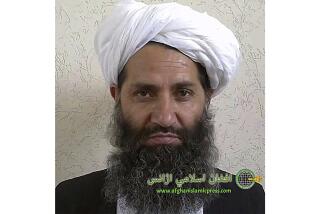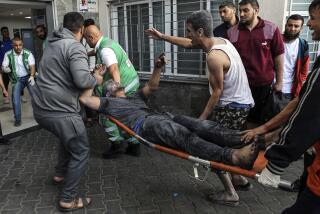Warlord’s Politics Could Prove Problematic
- Share via
QUETTA, Pakistan — He’s the answer to an American military planner’s prayers: an experienced and respected Afghan clan leader who hates the Taliban, wants Osama bin Laden out of his country and has declared a holy war not against the United States but against Bin Laden’s Arab fighters inside Afghanistan.
Gul Agha Shirzai, the last governor of Kandahar province before the Taliban took over in 1996, says he is ready to leave immediately for Afghanistan, where he claims to have 5,000 fighters in the Kandahar region ready to take on the regime in its own backyard.
“We can go tonight if we get the message,” he said in an interview at what has been his home for the past five years in Quetta. “Our men are inside and ready.”
Such a large and friendly force could be invaluable to American and British ground forces if they are dropped into the area around Kandahar, the southern city that is a Taliban stronghold. The Afghan fighters could offer protection, information and combat skills in extremely remote and otherwise hostile conditions.
U.S. Special Forces landed briefly in the Kandahar area Friday, and there have been hints out of both Washington and London that the arrival of more substantial allied ground forces is imminent.
“We are ready to move to Kandahar and get rid of the evil there,” Shirzai said as he sat with other elders.
But if Shirzai’s fighting capabilities seem a godsend for the United States’ short-term military objectives, his political views underscore why the longer-term goal of building a stable, unified Afghanistan where large terrorist organizations are no longer free to roam and train remains so elusive.
Shirzai is a strong supporter of the former Afghan monarch, Mohammad Zaher Shah--so strong that he refers to the deposed king as “Baba”--”Father.” He has consulted closely with Zaher Shah’s envoys since Sept. 11, and last week he reportedly spoke with the ex-king by telephone.
The problem is that Shirzai’s political loyalties appear to begin and end with Zaher Shah. Shirzai flatly rejects any suggestion of sitting down with other powerful factions whose numbers and firepower would make them extremely difficult to ignore in a post-Taliban era.
For example, he dismissed as impossible an idea floated last week during Secretary of State Colin L. Powell’s visit to Pakistan of an Afghan government composed of the Northern Alliance, moderate Taliban figures and a faction loyal to the former king.
“Powell is a good military person, but he doesn’t understand politics,” he said.
Shirzai gets impatient with the very use of the words “moderate Taliban,” claiming they amount to a contradiction in terms, while he views the various factions of the Northern Alliance as extremists willing to sell their country down the river for their own interests.
He finds the seven moderate former moujahedeen groups based in Peshawar, Pakistan, “all bad,” even though they support the former king, and he seems to have little time for the prominent former guerrilla commander Abdul Haq. Shirzai is also currently sparring with Hamid Karzai, a longtime ally and another Quetta-based Afghan power broker.
But he reserves a special contempt for hard-liners such as engineer Gulbuddin Hekmatyar, leader of the Hezb-i-Islami party, and other influential commanders associated with arch-fundamentalism, including the current governor of Paktia province, Jalaluddin Haqqani.
“We don’t like that guy,” Shirzai said of Haqqani. “He’s a pure fanatic. He denounced the king in an interview with the BBC. He’s worse than Gulbuddin.”
However, Shirzai said he would be willing to join many of these factions in a loya jirga--a gathering of tribal and ethnic leaders to discuss the future of Afghanistan--on one condition: that all participants were first disarmed.
As a kind of compromise, Shirzai said he decided to send a small delegation to a meeting of several hundred exiled Afghans scheduled for today in Peshawar.
Still, the very mention of Haqqani--and the idea of Americans talking about moderate Taliban leaders and the possible inclusion of the Northern Alliance in a future government--triggered an emotional response from Shirzai. He maintains that the U.S. is in danger of repeating earlier mistakes in Afghanistan.
“During the beginning of jihad [in this case, the 1980s war of resistance against the Soviet Union], the Americans and Pakistanis created all kinds of Communist groups, including fanatics,” he said. “We knew they would create problems, and they did. If you let this people in power again, you will have the same experience.
“This will only lead to more terrorism,” he added. “Then you will never get rid of this problem.”
Shirzai said he personally is not interested in joining a post-Taliban government.
“I don’t have any desire for this,” he said. “I want to work for a more national, more liberal, more developed Afghanistan. But to get there, I’m willing to fight to the last drop of my blood.”
More to Read
Sign up for Essential California
The most important California stories and recommendations in your inbox every morning.
You may occasionally receive promotional content from the Los Angeles Times.













